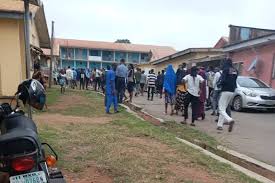Students of the prestigious University of Ibadan took to the streets to protest against the recent decisions by the university management to implement a 10-hour electricity rationing schedule and a hike in tuition fees. The protest, which began on Tuesday and continued into Wednesday, saw students carrying placards and expressing their frustrations at the university’s gate.

The trigger for the protests stemmed from an internal memo addressed to the Chief Engineer (Electrical) by the Director of Works and Maintenance Department, O.A Adetolu, which outlined the schedule for the rationed electricity supply. According to the memo, the Vice Chancellor had approved a 10-hour daily electricity supply on campus, with daytime supply scheduled from 8 am to 2 pm and nighttime supply from 10 pm to 2 am. This decision was met with strong opposition from the student body, prompting the Students’ Union President, Aweda Bolaji, to voice his discontent, labeling the policies by the management as “not satisfactory” and “an inconsiderate action.”
In addition to the electricity rationing, the students were also aggrieved by the announcement of a tuition hike and the introduction of what they referred to as “outrageous fees” by the university authorities. The students expressed deep dissatisfaction with these decisions, citing the challenges of coping with additional financial burdens in the midst of an already demanding academic environment.
The Students’ Union President, Aweda Bolaji, made a passionate call for a reversal of the new electricity schedule and tuition increment. He urged students to join in a peaceful demonstration against what he described as “injustice being meted out by both the miserable government and unconscionable management.” The mass action was scheduled to continue on July 17, 2024, with a call for neither lectures nor transportation within the school premises, starting from 5 am. Bolaji also demanded the withdrawal of the memo on electricity rationing and insisted on a total reversal of all fees, with refunds for those who had already made payments.
The protest also highlighted the ongoing victimization of three students of the University of Ibadan – Aduwo Ayodele, Olamide Gbadegesin, and Nice Linus – who had previously embarked on a peaceful protest on May 13, 2024. The Students’ Union condemned this victimization and called for an end to such actions.
The students’ protest underscores the importance of open dialogue and effective communication between university management and the student body. It also sheds light on the challenges that students face in accessing essential services and managing educational expenses. The students’ demand for a reversal of the electricity rationing schedule and tuition hike reflects their desire for fair and equitable policies that consider their welfare and educational needs.
The University of Ibadan, as a leading institution of learning, plays a vital role in nurturing the next generation of leaders and professionals. The decisions made by the university management have far-reaching implications for the academic and personal well-being of the students. As such, the resolution of these issues will be critical in ensuring a conducive and supportive learning environment for the students.
The outcome of the protests and subsequent engagements between the students and the university authorities will be closely monitored, as it holds significance for the overall welfare and academic experience of the students at the University of Ibadan.



